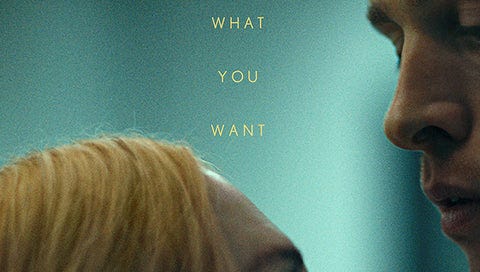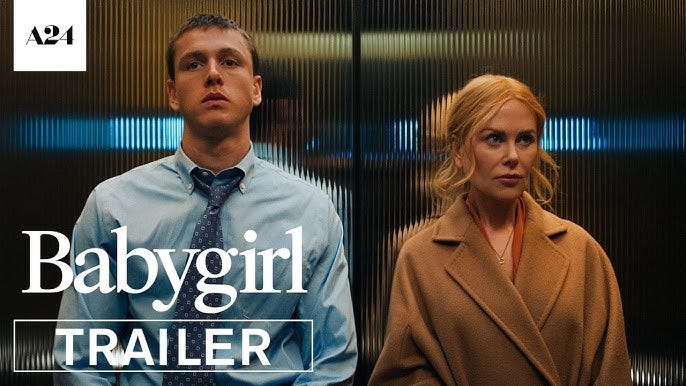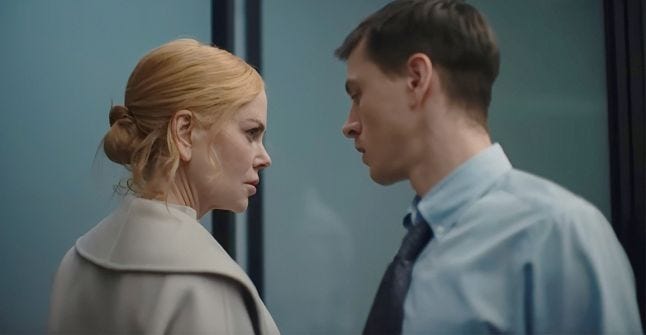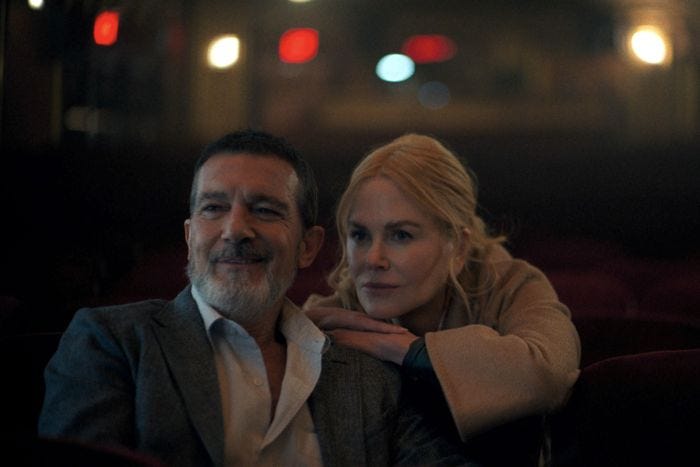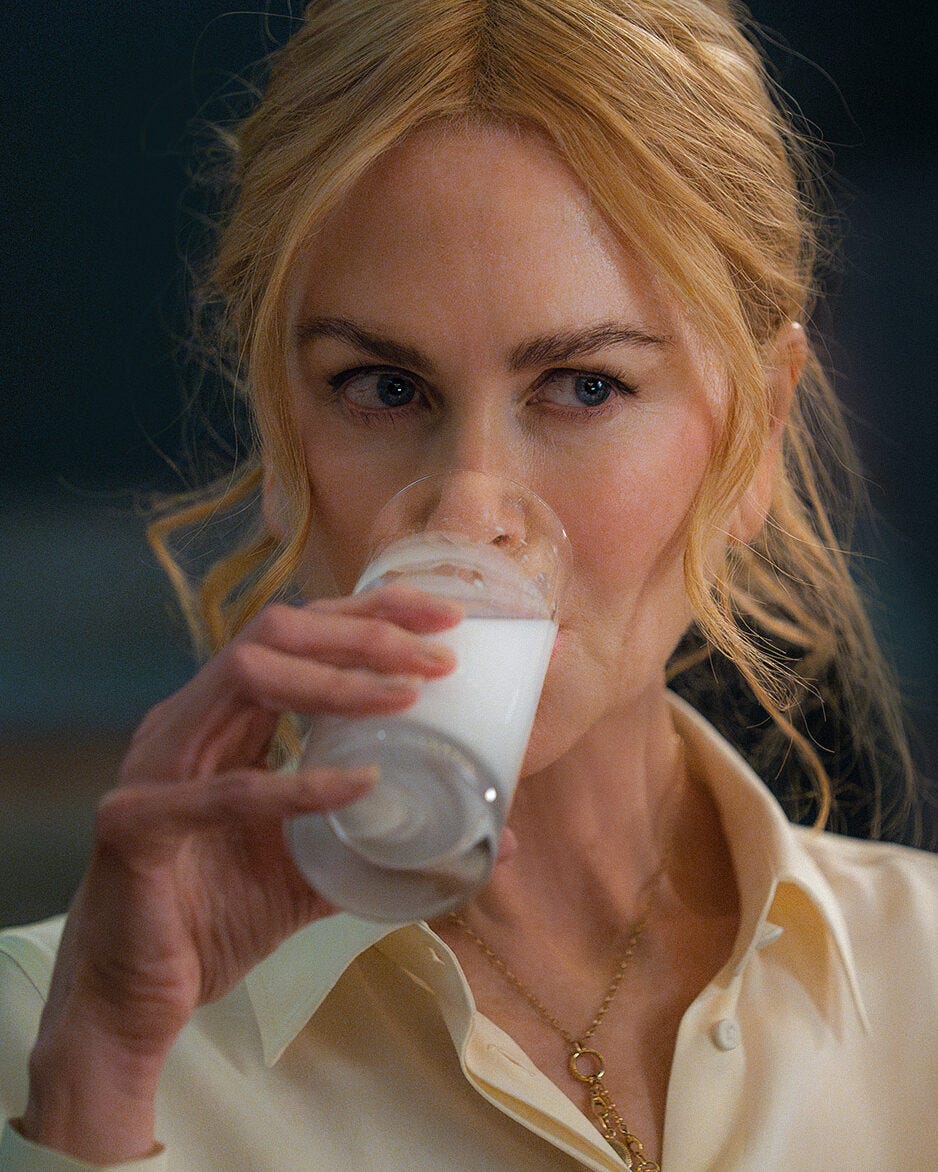I saw Babygirl yesterday (12/27/2024). It had a great trailer but the movie was nowhere near as good. I attribute this to a culture that is fixated on vibes to the detriment of substance. Babygirl is the latest film from Halina Reijn, the Dutch director of 2022’s Bodies Bodies Bodies. Her latest erotic thriller starring Nicole Kidman and Harris Dickinson is, much like her prior film, a classic case of a film not living up its trailer.
This is not an unusual occurrence; there are many films that don’t live up to the promises of their trailers. The Comic-Con first look of Suicide Squad (in)famously gave many hope that the DC Extended Universe was turning around, offering the first look at Margo Robbie’s iconic portrayal of Harley Quinn, but the film that was released felt like tonal chaos. While there may indeed be an Ayer Cut out there that meets the promise and tone of that initial teaser, the film that released in 2016 was disappointing. Battle: Los Angeles, Avengers: Age of Ultron, The Phantom Menace, and Man of Steel are other films where the general consensus is that they don’t live up to the trailers.
It’s understandable why this phenomenon would occur. In the effort of putting your best foot forward, the trailer ought to contain the best parts of the film: major setpieces, witty dialogue, beautiful cinematography. The goal is to get butts in seats, and making a trailer that is perfectly emblematic of the film that gets played in theaters does not always align with that goal. It’s the same reason why advertising in general often feels scammy. Truths get stressed. Appearances are polished. This compulsion towards artifice - to present the product in the best light possible, even at the risk of losing authenticity - is entirely understandable when art intersects with capitalism.
I consider the trailer for Babygirl a triumph. Let’s analyze why.
Right off the bat, it establishes the premise of the film. Within the first 30 seconds, the viewer understands:
a CEO of a major corporation (Nicole Kidman) has an encounter with a handsome young man (Harris Dickinson) on her way to work.
This young man is a new intern at her company.
We see an attraction and thus a sense of tension when we see how bold this young man is.
Slowly crescendo over the next 30 seconds; this man is irresistibly charming. And he’s in control. There’s a great shot at 1:02 where she leans in for a kiss and he pulls back. He controls when the threshold is crossed.
Cue the music and the montage of subtle flirtation, Fifty Shades-tier BDSM lingo (“I tell you what to do and you do it”). Introduce more moments of tension, both internal (with her unsure of whether to indulge in this affair) as well as external (with shots of her husband and kids). There’s another great shot at 2:00 - over the young man’s shoulder looking at a distraught Nicole Kidman. He asks, “Do you wanna stop?” At first she nods, then she shakes her head no. This shot didn’t make it into the final cut of the film, unfortunately. One more quick montage of making out and random shots that look interesting, then the stinger: the young man whispers “good girl” as he passes her in a bar. Cue her shocked expression.
Like Bodies Bodies Bodies before it, this trailer succeeds at establishing vibes. The critic quotes played over the abrasive electronic score beat you over the head that this movie is sexy, daring, explosive. The vibes, admittedly, are alluring. Lots of shots of making out, fingers in mouths, a girlboss protagonist, the age gap between the characters, etc. all make for something that is, on the surface, interesting. Though I saw it at 10:15 AM on the day after Christmas, the quarter-filled auditorium was mostly comprised of single women. I sat my butt down in the AMC, like I imagine many of these women did, hoping for something titillating, entertaining, and provoking, in the vein of the genuine erotic thrillers of yore like Basic Instinct or Fatal Attraction.
The film, however, was nothing of the sort. It, much like Bodies Bodies Bodies, was just vibes. Gen-Z loves vibes. By vibes, I mean the invocation of a feeling or emotion via surface-level sensory engagement. We’ll often call the aspects of this engagement aesthetics. This is to say, a certain combinations of aesthetics cultivate a vibe.
When you are at a bar surrounded by torches, huts, and tikis, these things attempt to engender a certain feeling within you: a feeling of warmth, of relaxation, of comfort, and of exotic-ness. But make no mistake, the vibes do not necessarily make that bar warm, relaxing, comforting, and exotic. Qualities come from substance, not vibes.
The same goes for people. A person’s appearance, speech, and mannerisms can put forward a vibe, but you need to genuinely invest time in a person to see the full breadth and complexity of their soul.
Vibes can be awesome, especially when they are compressed down into trailers, shorts, edits on social media. However, vibes alone do not yield substance. When vibes are stretched out over two hours without genuinely compelling drama to weave it all together, it ends up feeling like a waste of time. In a similar vein, a bar in Manhattan with $20 cocktails that happens to have some tropical aesthetic feels hollow in comparison to a genuine shack in the non-touristy parts of Hawaii.
The actual film behind Babygirl had nothing interesting to say about desire or power dynamics. Antonio Banderas plays the husband, a broadway director putting up an adaptation of Hedda Gabbler.
This kind of Buffalo Bill skin-inhabitation of a real work of drama with similar themes is something you see a lot these days but it is rarely effective. It brings even more attention to the lack of dramatic substance in the primary work, almost saying Hey, you know that other play about female desire? My characters talk about it. Therefore, my work is also about female desire. Such vain attempts to ascribe a level of importance to one’s work feels shallow. Yes, both Hedda Gabbler and Babygirl are about neurotic women whose desires conflict with the values deemed rational by society. She absconces her family and galavants off in the direction of her personal desire. This is a fine story to tell, however Babygirl does not have the juice to yield a worthy squeeze in this regard.
The characters are thin - Harris Dickinson, a fine actor I might add - is given very little to work with. Moments where he is able to talk about his past and his own wants and needs feel obligatory and unnatural. These moments do not result in meaningful complications to the plot or the fundamental drama. The cat and mouse game does not escalate. There is no real reckoning with the stakes (potential loss of family, job, reputation). The only real plot events are three instances of people finding out that this affair is going on between the CEO and the intern. None of these revelations result in scenes of compelling drama.
Capacity for critical thinking and artistic analysis continues to wane right alongside attention spans in a world where short form video has hijacked our dopamine receptors. Few people engage with art of any kind outside of surface-level aesthetics. As this trend continues and as the TikTok generation grows up, expect more movies that are simply vibes and nothing more.

